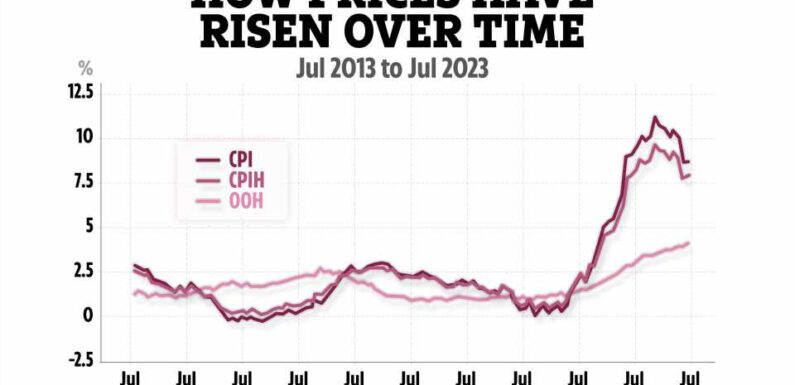
THE UK inflation rate has fallen again – to 6.8% in the year to July, official figures show.
The consumer price index (CPI) measure of inflation fell down from a rate of 7.9% in June, according to the Office of National Statistics (ONS).
This is the slowest rate drop since February 2022 though analysts predicted a reading of 6.7% for the month.
It means prices are still rising but at a slower rate than before.
Inflation is a measure of how the price of goods and services has changed over the past year.
Matthew Corder, deputy director of prices at the ONS, said: "Inflation slowed markedly for the second consecutive month, driven by falls in the price of gas and electricity as the reduction in the energy price cap came into effect.
Read more in money
Wage growth hits new high & inflation set to fall, as PM says plan is working
Wages rise for millions of workers at record rate – what it means for you
"Although remaining high, food price inflation has also eased again, particularly for milk, bread and cereal.
"Core inflation was unchanged in July, with the falling cost of goods offset by higher service prices."
Chancellor of the Exchequer Jeremy Hunt said: "The decisive action we've taken to tackle inflation is working, and the rate now stands at its lowest level since February last year.
"But while price rises are slowing, we're not at the finish line.
Most read in Money
Wilko slashes prices in HUGE sale as rescue deadline for offers approaches
Martin Lewis' MSE issues urgent car insurance warning to all drivers
Thousands on low incomes missing out on ‘life changing’ sum – do you qualify?
Millions set for state pension rise of £869 next year – how much will you get?
"We must stick to our plan to halve inflation this year and get it back to the 2% target as soon as possible."
Elsewhere, the government has said next year’s rise in English rail fares will be below inflation, though it hasn't confirmed exactly what that figure will be.
The Department for Transport (DfT) said the increase will not be as high as the rise in the Retail Prices Index (RPI) for the 12 months to July.
Rail fares usually rise each year according to July inflation figures.
That was 12.3% last year, but the government used July’s average earnings growth of 5.9% to determine this year’s increase in the cost of train travel.
A DfT spokesman said: “Following last year’s biggest-ever government intervention to cap rail fare increases well below inflation, we’ll continue to protect passengers from cost-of-living pressures and we will not increase next year’s rail fares by as much as the July RPI figure.
“Any increase will also be delayed until March 2024, temporarily freezing fares for passengers to travel at a lower price for the entirety of January and February as the government continues with its plan to halve inflation.”
What it means for your money
A drop in inflation usually means that prices are still rising, but at a slower rate.
Adam Thrower, head of savings at Shawbrook bank, said: “The scenario of falling inflation coupled with rising interest rates presents a window of opportunity for savers.
"The simultaneous increase in interest rates earlier this month, followed by another fall in inflation, means savers are beginning to see the benefits of higher rates.
"However, inertia and apathy are hindering people from maximising their savings potential.
"A resistance to change, sticking with the familiar and a lack of motivation means savers are foregoing higher returns."
High inflation means the cost of everyday essentials, like food and energy are rising, meaning your money doesn't go as far.
The BoE, the UK's central bank, can hike what's known as its base rate to try and bring it down.
While it means people with savings see a boost, it also means interest rates on mortgages rise as well, piling pressure on homeowners.
The Bank of England has been criticised for being wrong with its inflation projections previously.
James McManus, chief investment officer, Nutmeg, added that today’s inflation number is "something of a mixed picture".
He said: "On the one hand, the headline figure continues to fall – as the effect of lower energy prices feeds through – and is something that should offer some relief to consumers as the rate at which prices are rising is continuing to slow.
"Equally, it provides some optimism for policymakers at the Bank of England that measures it has taken to bring inflation under control and closer to its 2% target, are starting to take effect.
"However, this needs to be balanced with the “stickier” and still stubborn impact of higher food prices and rising wages."
Wages rose at a record rate this week (August 15), standing at 7.8% in April to June this year.
Read More on The Sun
I wore pjs as outerwear on holiday, people say I look like Victoria’s Secret angel
Max George fights back tears as he ‘fulfils Tom Parker’s dying wish’
It means wages are rising at a faster rate. Last month regular pay went up by 7.3%, and 6.9% including bonuses.
However, taking into account inflation, which is currently 7.9%, means that wages only rose by 0.5% for total pay and 0.1% for regular pay in real terms.
Do you have a money problem that needs sorting? Get in touch by emailing [email protected].
You can also join our new Sun Money Facebook group to share stories and tips and engage with the consumer team and other group members.
Source: Read Full Article








